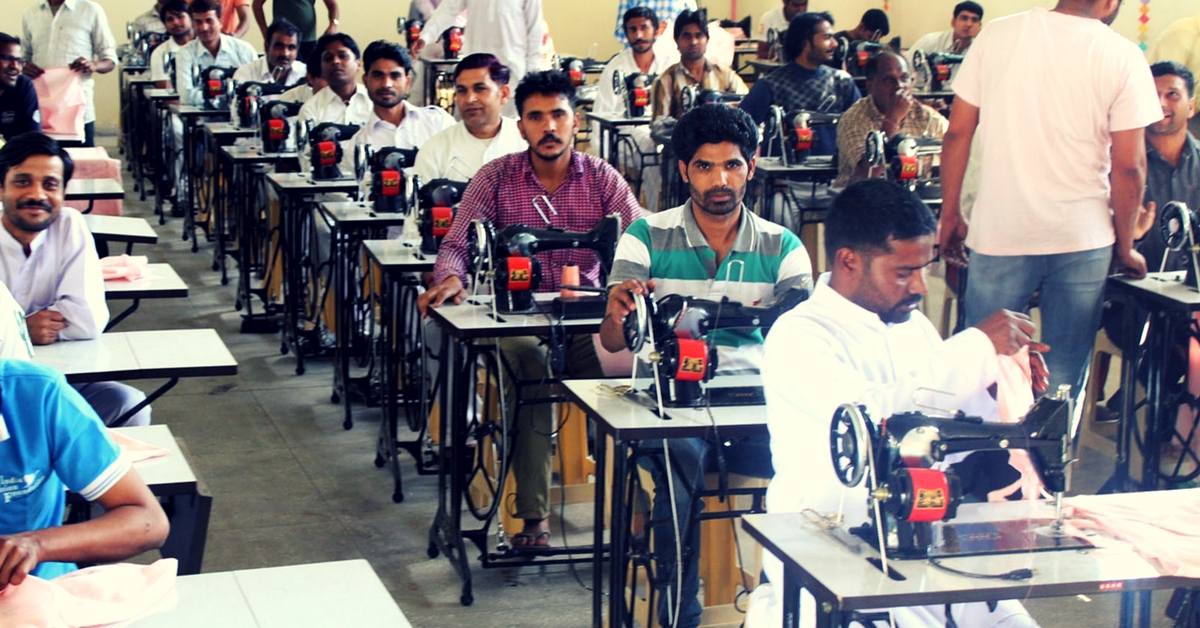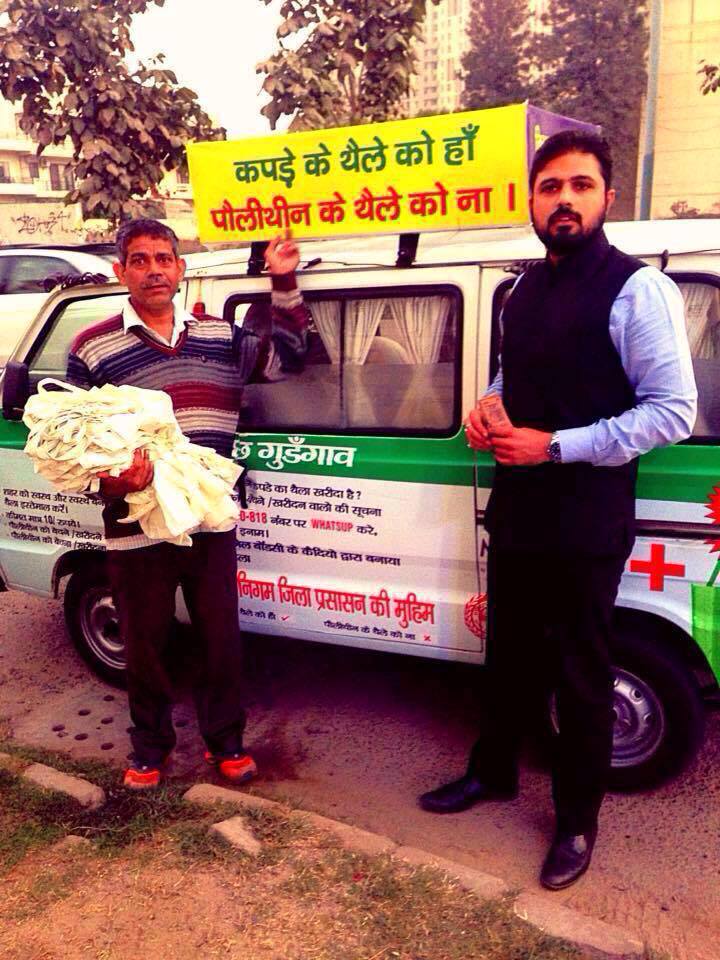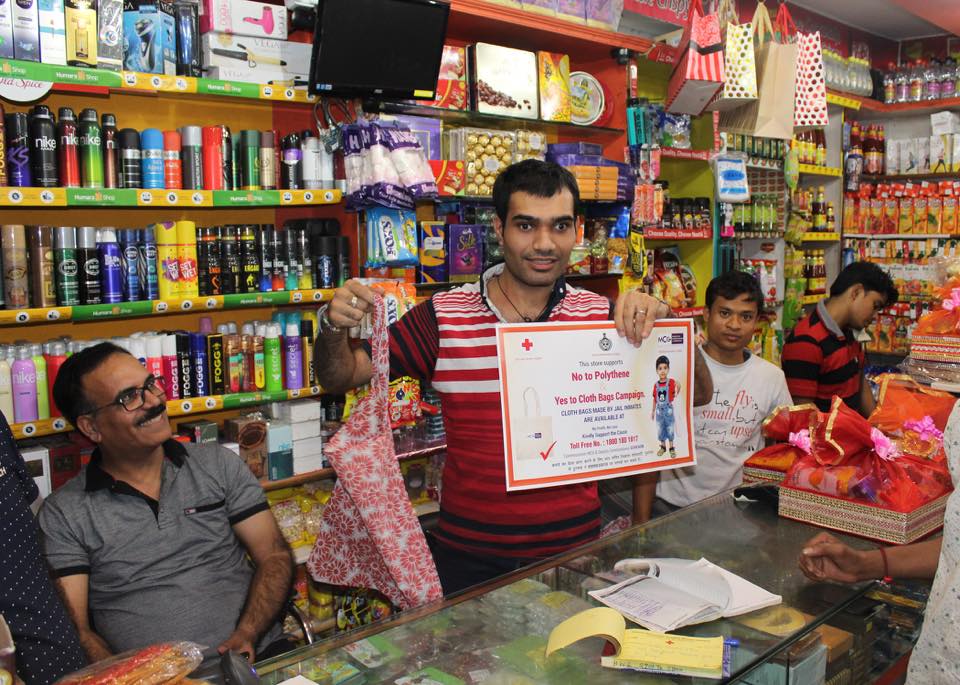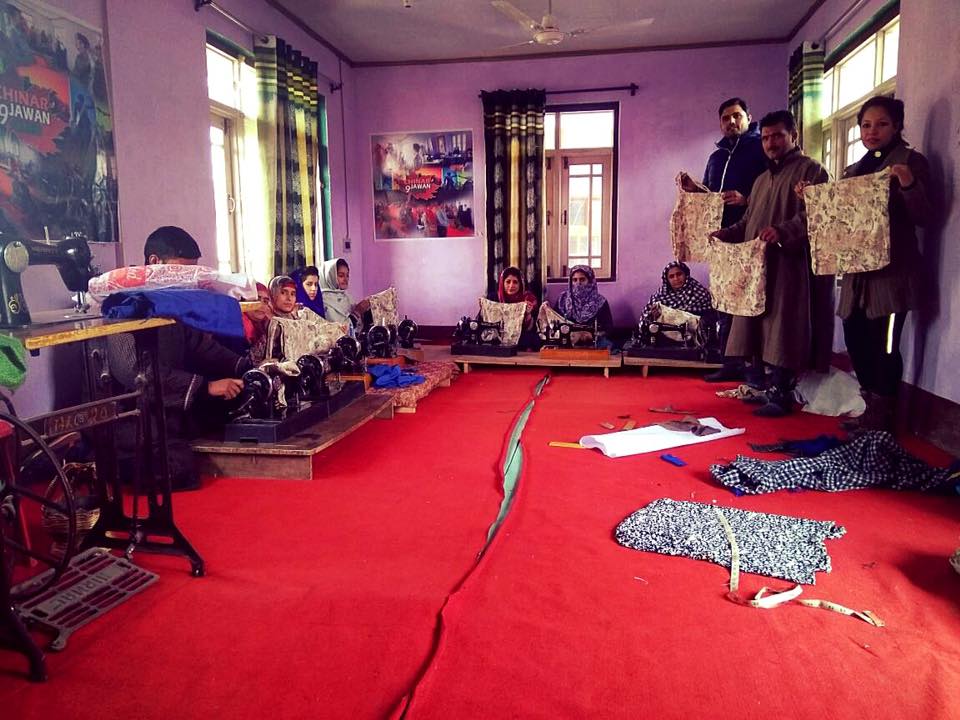Fighting Plastic Pollution By Empowering Prisoners? This Man Is Doing Just That!
On February 9, 2016, the ‘No to Polythene and yes to Cloth Bags’ campaign was formally kickstarted when a cloth bag manufacturing unit was set up inside Gurgaon Jail.

32-year-old Osho Kalia still remembers the day he watched the short film ‘The Plastic Cow.’ The painful sight of 50 kgs of plastic being pulled out of the poisoned animal’s stomach as it lay on the ground at the mercy of local anaesthesia, shook him to the core.
This led Osho to embark on a journey and explore the cowsheds around Gurgaon. His interaction with the owners and caretakers at these sheds revealed how they would get a minimum of two or three cows full of plastic, which then had to be operated upon to save them painful deaths.
Speaking to The Better India, Osho says it was perhaps one of the instances that shaped his decision to quit a successful career in Human Resources at IBM in 2011 and join the social sector.
He also became one of the founding members of the Geeli Mitti Foundation, starting multiple campaigns, one of which was ‘No to Polythene and yes to Cloth Bags’.

At the time, the Municipal Corporation of Gurugram (MCG), had declared a plastic ban and was struggling with on-ground action by residents. Osho got in touch with the local Deputy Commissioner T L Satyaprakash and explained how the only way to make the ban work was to provide a suitable alternative to plastic.
When the Deputy Commissioner asked Osho what this alternative could be, Osho’s mind wandered to his childhood days in Punjab when a home-stitched cloth bag hung by the cycle of most locals on their trips to the market. And so, he quickly told the officer how the large-scale production of cloth bags could be the perfect solution.
Speaking about the Deputy Commissioner’s response, Osho shares, “He was aboard with the idea right from day one. But he asked me for a few samples. So I called home in Punjab and asked some of the ladies there to stitch a few samples and send them to me. When I took the samples to him, he asked me who would make the bags. And at the time, I said, there is a prison in town with 2200 inmates, and they can get work.”
The Deputy Commissioner who was also simultaneously heading the Municipal Corporation of Gurgaon was impressed and it was only a matter of time till the local Red Cross Society got involved too.
On February 9, 2016, the ‘No to Polythene and yes to Cloth Bags’ campaign was formally kickstarted when a cloth bag manufacturing unit was set up inside Gurgaon Jail. The Municipal Corporation of Gurgaon installed 50 machines to facilitate the process.

The first trainer to teach the inmates the skill of sewing cloth bags was a local tailor Osho brought. While the training which lasted for about two days was relatively an easier task to pull off, the question was how they could make this a sustainable project. Where would they source such a large quantity of cloth?
With the help of the local body, the Deputy Commissioner and Red Cross, Osho then requested all textile companies to donate the extra cloth they had to support the cause. “In the process of manufacturing fabric, there is often large amounts of surplus cloth that gets rejected or is of no use to the company. We wanted companies to come forward and donate this cloth rather than wasting it. We did not want this project to take off and then halt suddenly due to lack of cloth.”
Thanks to the relentless support of these textile companies, including Orient Craft Export Textiles, whose owner Mr Sudhir Dhingra has been a patron of the project right from the beginning, it continues to receive surplus cloth every month.
Till date, about 75 inmates have successfully made over 2.5 lakh bags.
As for the wages that the inmates earn per bag, the prison administration took the lead. While the rules back in the day were that each inmate would earn Rs 25 per day, Osho’s team proposed that the inmates be given a daily wage depending on their skill.
“It was only fair. Because when we used this model, we realised that there were a few inmates, who would make over 180 bags in three hours, while the others could only make ten. Each inmate deserved to be paid as per the hard work and hours he put in,” says Osho.
After much debate, the stakeholders concluded that each inmate would be paid Rs 2 per bag, of which Re 1 would be their own earning, and the equal amount would go to the Jail Welfare Fund.
Once the bags were manufactured, Osho travelled to shops around Gurgaon and spoke to shopkeepers about switching to cloth bags.
Due to his efforts, many shopkeepers in Gurgaon’s sector 56 have started buying these cloth bags.

But not all shopkeepers were easy to convince. “I remember travelling to every shop in Gurgaon with the cloth bags loaded in a vehicle with a driver provided by the Red Cross Society. There were times when shopkeepers would shut the doors on our faces or even angrily hold my collar, blaming us for the circulars being issued for the plastic ban,” recalls Osho.
But Osho came up with a logical explanation for these woes. “Many shopkeepers invest money in printing or buying plastic bags and giving them off to the customers in quantities like 10,000 to 40,000, free of cost. We explained to them that they were not only incurring additional costs by buying plastic bags but were also harming the environment by giving them to the customers free. We explained to them, that even if they bought these cloth bags from us for Rs 14, they could still profit from them by selling them to the customer for Rs 15. While most customers wouldn’t mind buying a cloth bag, the shopkeepers could earn a Re 1 profit per bag too.”
While the project in Gurgaon jail has been halted due to administrative changes, Osho’s team has been getting calls from the Faridabad jail to replicate the model there.
READ MORE: One Man Is Helping Change Souls & ‘Soles’ Inside Maharashtra’s Largest Prison!
The team is now also employing not just inmates but also women in different parts of the country to take the work forward.

These are women who were once restricted to the role of homemakers are now contributing to the family income through the stitching charges they earn per bag.
“The beauty of this project is that what started as a personal project has turned into an extensive movement to curb the plastic pollution. Not only does it help in making an alternative available to the general public but also creating income-generation opportunities for women and prison inmates,” he says.
In the last three years, this project has spread from Gurgaon Jail to villages in Kashmir, Ghaziabad, Ranchi, Jharkhand, Gurgaon, Nainital and Bhopal.
We hope this project continues to flourish not just for the sake of the environment, but for all involved.
If Osho’s story inspired you, get in touch with him at [email protected]
Know more about Geeli Mitti Foundation here.
(Edited by Shruti Singhal)
Like this story? Or have something to share?
Write to us: [email protected]
Connect with us on Facebook and Twitter.
NEW: Click here to get positive news on WhatsApp!
If you found our stories insightful, informative, or even just enjoyable, we invite you to consider making a voluntary payment to support the work we do at The Better India. Your contribution helps us continue producing quality content that educates, inspires, and drives positive change.
Choose one of the payment options below for your contribution-
By paying for the stories you value, you directly contribute to sustaining our efforts focused on making a difference in the world. Together, let’s ensure that impactful stories continue to be told and shared, enriching lives and communities alike.
Thank you for your support. Here are some frequently asked questions you might find helpful to know why you are contributing?


This story made me
- 97
- 121
- 89
- 167











